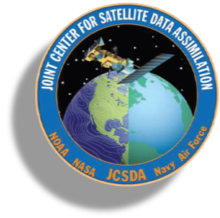Article by Katherine Shanahan, JCSDA Program Coordinator
Every year, members of the JCSDA community and beyond look forward to the Technical Review Meeting and Science Workshop. The annual meeting gathers the JCSDA core team, partners, and the wider scientific community to share in cutting-edge science and updates related to JCSDA projects. The 2021 meeting was highly anticipated due to the first public release of JEDI code, the achievement of several project milestones over the past year, and the COVID-19 induced cancellation of the 2020 meeting.
The 18th JCSDA Technical Review Meeting and Science Workshop was held virtually for the first time the week of June 7 - 11, 2021. Over 200 prospective participants registered with attendance of upwards of 150 guests each day, which proved to be a record for this annual event. The meeting was held entirely on Google Meet with all presentations occurring in the main room. Parallel breakout sessions took place in separate meeting rooms to allow participants to effortlessly choose which session they would like to attend. The virtual format, with meeting sessions spread over three hour blocks each morning, made it easier for overseas attendees to participate.
Several attendees pose for a “group picture” at the 18th JCSDA Technical Review Meeting and Science Workshop, held virtually June 7 - 11, 2021.
The meeting kicked off on June 7th with several agency overviews from JCSDA Executive Team members including the Navy, NOAA, NASA, the Air Force, and the UK Met Office. Over the next four days, 17 full-length and 22 lightning (five-minute) presentations were given by members of the data assimilation and weather community, including JCSDA core team members. These presentations spanned four main topics: The Joint Effort for Data assimilation Integration (JEDI), the Community Radiative Transfer Model (CRTM), JCSDA applications, and improved use of observations.
On Tuesday and Thursday, the group was invited to participate in various breakout sessions to discuss topics of interest including the future of coupled data assimilation in relation to JEDI, integration of artificial intelligence and machine learning with JEDI, and JCSDA training and community support. Participants came from assorted universities, national/international scientific institutions, the private sector, and more, bringing diverse perspectives to the breakout sessions.
According to numerous attendees, the virtual meeting was a success, with many already looking forward to next year’s meeting. Copies of the presentation slides, as well as breakout session summaries, can be found on the meeting webpage.

